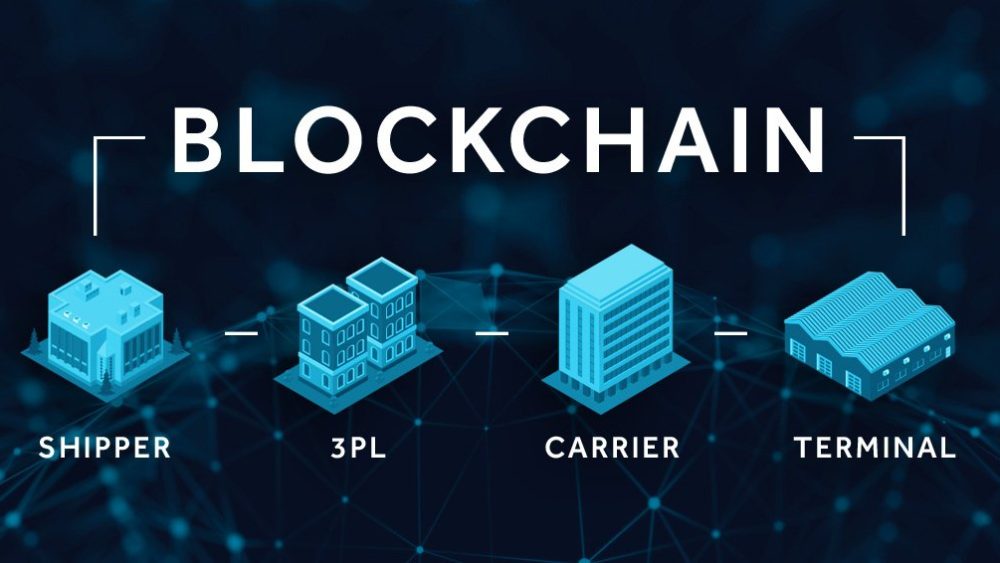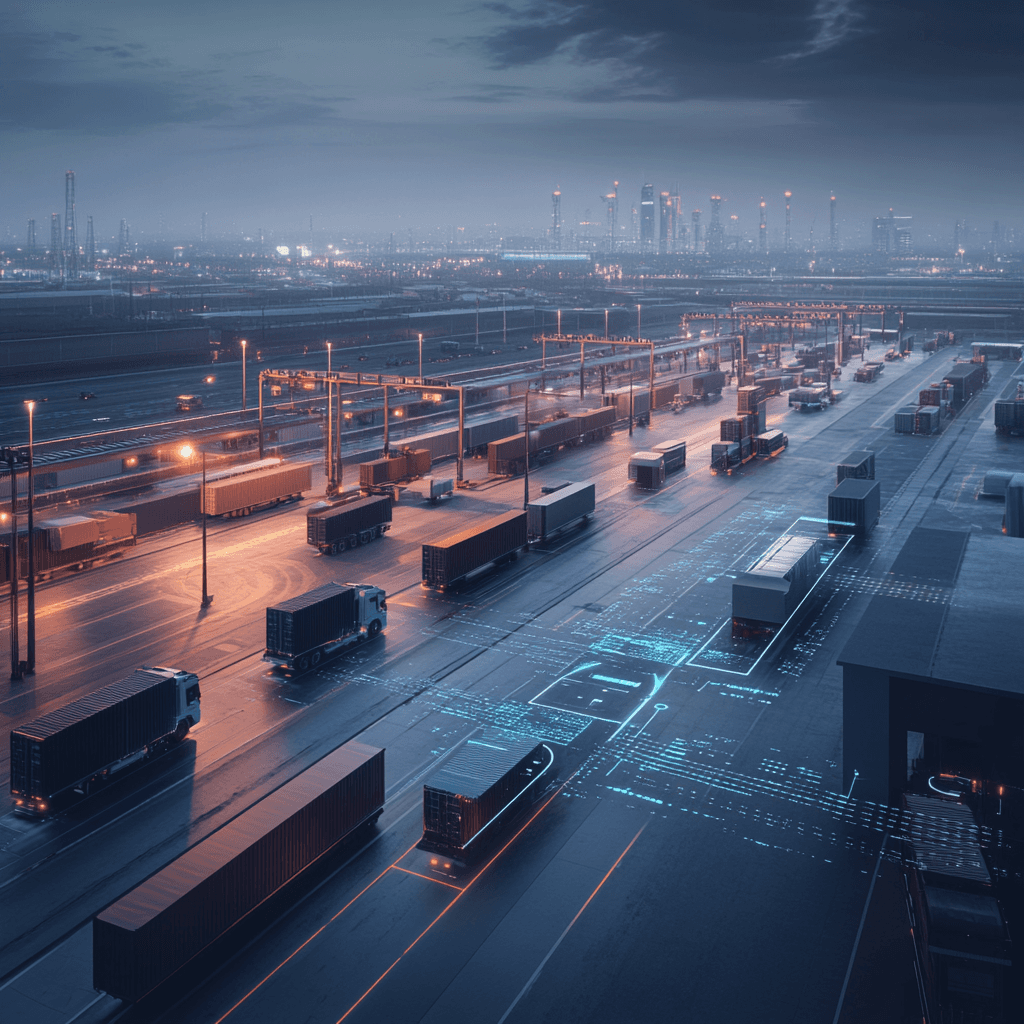
Insights
November 29, 2024
Major US trucking firms are implementing blockchain technology to secure transactions and data sharing across the supply chain, aiming to reduce fraud and increase transparency.

Insights
November 29, 2024
Major US trucking firms are implementing blockchain technology to secure transactions and data sharing across the supply chain, aiming to reduce fraud and increase transparency.
Discover how major US trucking companies are revolutionizing supply chain processes by utilizing blockchain technology. Learn how this innovation addresses fraud, enhances transparency, and ensures secure data sharing across the transportation industry.
The US trucking industry, long considered the backbone of national logistics and supply chains, is undergoing a transformative shift driven by blockchain technology. Faced with significant operational challenges like fraud, inefficiency, and lack of transparency, major trucking firms are turning to blockchain solutions to revamp how transactions are secured and how data is shared across the supply chain. This adoption signals not just a technological upgrade but a paradigm shift in the way the industry operates, benefiting various stakeholders from shippers to fleet operators.
The trucking sector handles a monumental volume of goods daily, making it a lucrative target for fraud. From payment inconsistencies to identity theft, the current logistics landscape is riddled with vulnerabilities. Additionally, manual processes for tracking shipments and verifying contracts create inefficiencies and potential errors that cost valuable time and money. Blockchain technology, with its ability to provide secure, immutable transaction records and streamline data-sharing processes, is proving to be a game-changing solution for these pressing issues.
Blockchain technology is fundamentally a decentralized digital ledger that records transactions across multiple platforms securely and transparently. Each "block" in the chain contains a cryptographic hash of the previous block, a timestamp, and transaction data, ensuring that no single stakeholder can tamper with records without alerting others on the network. In the context of trucking, this ensures that key data points such as freight shipments, payment information, and delivery timelines remain accurate and immutable. The result is enhanced security, streamlined operations, and an overarching level of trust among stakeholders.
For an industry as sprawling and interconnected as trucking, collaboration is key. Yet, inefficiencies often stem from siloed data and a lack of trust between various supply chain participants, including carriers, brokers, shippers, and regulators. Blockchain addresses these issues by fostering a shared digital infrastructure. For instance, trucking companies can use blockchain-enabled smart contracts to automate processes such as payments upon delivery verification. This eliminates the need for intermediaries, reduces the risk of disputes, and speeds up the settlement cycle. Moreover, regulators gain better visibility into compliance data, ensuring adherence to safety and environmental standards without tedious manual inspections.
Transparency in the supply chain is not just a buzzword; it's becoming an operational necessity. With increasing demands from both customers and businesses for real-time shipment tracking, blockchain provides a credible solution. By integrating blockchain into existing tracking systems, trucking firms can offer end-to-end visibility of shipments. Each step in the process, from initial pick-up to final delivery, is logged on the blockchain, which operates as a single source of truth. This eliminates discrepancies and offers clarity to all involved parties, enhancing customer satisfaction and operational efficiency.
Fraud remains one of the trucking industry's most persistent challenges. Cargo theft, miscommunication in payment systems, and identity fraud are some of the top issues plaguing the sector. Blockchain significantly mitigates these risks. Since every transaction on a blockchain is encrypted and time-stamped, fraudsters face insurmountable hurdles in altering records. For example, using blockchain, a carrier registered to transport a specific shipment can have its credentials validated on the ledger, instantly preventing bad actors from impersonating legitimate operators. Additionally, automated systems can flag discrepancies or unusual patterns in real-time, reducing the risk of loss due to fraud.
Several major trucking firms and industry leaders in the United States have already begun adopting blockchain technology, demonstrating the tangible benefits it can provide. Industry consortiums such as the Blockchain in Transport Alliance (BiTA) are leading the charge by developing standards and promoting use cases within the logistics and trucking industry. Companies like UPS and FedEx are not only experimenting with blockchain but are also integrating it into their operations. These firms are leveraging blockchain to implement real-time freight tracking, smart contracts, and secure billing. The early results point to reduced operational delays, minimized risks, and increased trust between all parties in the supply chain.
As promising as blockchain may be, its implementation is not without challenges. For one, integration into an industry steeped in traditional practices requires a significant change management effort. Training employees, revising operational workflows, and convincing smaller partners to adopt the technology remain hurdles. Furthermore, the scalability of blockchain solutions and their energy consumption are concerns that developers and adopters must address to ensure long-term viability. The trucking industry, with its diverse array of players big and small, will need to ensure that blockchain platforms are user-friendly, interoperable, and cost-effective.
The adoption of blockchain in trucking is not happening in isolation; it reflects a broader trend of digital transformation within the transportation and logistics sectors. Emerging technologies like the Internet of Things (IoT), artificial intelligence, and machine learning are also being used in conjunction with blockchain to further optimize operations. For instance, IoT-enabled sensors can provide real-time data about cargo conditions, such as temperature and humidity, which is then securely logged on the blockchain. This level of integration enhances supply chain integrity while paving the way for further advancements.
The push for blockchain adoption also aligns with wider global trends toward sustainability and responsible business practices. By improving data accuracy and reducing fraud, fuel consumption, and unnecessary trips, blockchain contributes to lower carbon emissions. Many trucking companies see this as a win-win, addressing both operational and environmental challenges while meeting regulatory demands related to climate change and emissions reductions.
Looking toward the future, the role of blockchain in trucking will only grow as more companies recognize its potential. Analysts predict that blockchain will eventually become a standard tool for supply chain management, akin to GPS tracking or fleet telematics. As adoption increases, the technology's initial growing pains, such as high development costs and interoperability issues, are expected to diminish. Policymakers and industry stakeholders will likely push for regulatory frameworks that encourage blockchain integration while ensuring data privacy and security.
Major US trucking firms adopting blockchain technology is not merely a fleeting trend; it marks the beginning of a new era in logistics and supply chain management. Trucking companies that invest in this technology now will position themselves at the forefront of innovation, gaining a competitive edge in a rapidly evolving marketplace. By addressing pivotal issues like fraud, inefficiency, and transparency, blockchain is proving to be not just a technology of the future but a solution for the industry's most pressing challenges today. As the trucking industry charts its path forward, one thing becomes clear: blockchain is not just a tool but a pillar of modern logistics operations. Businesses that harness its power stand to not only succeed but also lead in a world that increasingly demands efficiency, security, and accountability.
The US trucking industry, long considered the backbone of national logistics and supply chains, is undergoing a transformative shift driven by blockchain technology. Faced with significant operational challenges like fraud, inefficiency, and lack of transparency, major trucking firms are turning to blockchain solutions to revamp how transactions are secured and how data is shared across the supply chain. This adoption signals not just a technological upgrade but a paradigm shift in the way the industry operates, benefiting various stakeholders from shippers to fleet operators.
The trucking sector handles a monumental volume of goods daily, making it a lucrative target for fraud. From payment inconsistencies to identity theft, the current logistics landscape is riddled with vulnerabilities. Additionally, manual processes for tracking shipments and verifying contracts create inefficiencies and potential errors that cost valuable time and money. Blockchain technology, with its ability to provide secure, immutable transaction records and streamline data-sharing processes, is proving to be a game-changing solution for these pressing issues.
Blockchain technology is fundamentally a decentralized digital ledger that records transactions across multiple platforms securely and transparently. Each "block" in the chain contains a cryptographic hash of the previous block, a timestamp, and transaction data, ensuring that no single stakeholder can tamper with records without alerting others on the network. In the context of trucking, this ensures that key data points such as freight shipments, payment information, and delivery timelines remain accurate and immutable. The result is enhanced security, streamlined operations, and an overarching level of trust among stakeholders.
For an industry as sprawling and interconnected as trucking, collaboration is key. Yet, inefficiencies often stem from siloed data and a lack of trust between various supply chain participants, including carriers, brokers, shippers, and regulators. Blockchain addresses these issues by fostering a shared digital infrastructure. For instance, trucking companies can use blockchain-enabled smart contracts to automate processes such as payments upon delivery verification. This eliminates the need for intermediaries, reduces the risk of disputes, and speeds up the settlement cycle. Moreover, regulators gain better visibility into compliance data, ensuring adherence to safety and environmental standards without tedious manual inspections.
Transparency in the supply chain is not just a buzzword; it's becoming an operational necessity. With increasing demands from both customers and businesses for real-time shipment tracking, blockchain provides a credible solution. By integrating blockchain into existing tracking systems, trucking firms can offer end-to-end visibility of shipments. Each step in the process, from initial pick-up to final delivery, is logged on the blockchain, which operates as a single source of truth. This eliminates discrepancies and offers clarity to all involved parties, enhancing customer satisfaction and operational efficiency.
Fraud remains one of the trucking industry's most persistent challenges. Cargo theft, miscommunication in payment systems, and identity fraud are some of the top issues plaguing the sector. Blockchain significantly mitigates these risks. Since every transaction on a blockchain is encrypted and time-stamped, fraudsters face insurmountable hurdles in altering records. For example, using blockchain, a carrier registered to transport a specific shipment can have its credentials validated on the ledger, instantly preventing bad actors from impersonating legitimate operators. Additionally, automated systems can flag discrepancies or unusual patterns in real-time, reducing the risk of loss due to fraud.
Several major trucking firms and industry leaders in the United States have already begun adopting blockchain technology, demonstrating the tangible benefits it can provide. Industry consortiums such as the Blockchain in Transport Alliance (BiTA) are leading the charge by developing standards and promoting use cases within the logistics and trucking industry. Companies like UPS and FedEx are not only experimenting with blockchain but are also integrating it into their operations. These firms are leveraging blockchain to implement real-time freight tracking, smart contracts, and secure billing. The early results point to reduced operational delays, minimized risks, and increased trust between all parties in the supply chain.
As promising as blockchain may be, its implementation is not without challenges. For one, integration into an industry steeped in traditional practices requires a significant change management effort. Training employees, revising operational workflows, and convincing smaller partners to adopt the technology remain hurdles. Furthermore, the scalability of blockchain solutions and their energy consumption are concerns that developers and adopters must address to ensure long-term viability. The trucking industry, with its diverse array of players big and small, will need to ensure that blockchain platforms are user-friendly, interoperable, and cost-effective.
The adoption of blockchain in trucking is not happening in isolation; it reflects a broader trend of digital transformation within the transportation and logistics sectors. Emerging technologies like the Internet of Things (IoT), artificial intelligence, and machine learning are also being used in conjunction with blockchain to further optimize operations. For instance, IoT-enabled sensors can provide real-time data about cargo conditions, such as temperature and humidity, which is then securely logged on the blockchain. This level of integration enhances supply chain integrity while paving the way for further advancements.
The push for blockchain adoption also aligns with wider global trends toward sustainability and responsible business practices. By improving data accuracy and reducing fraud, fuel consumption, and unnecessary trips, blockchain contributes to lower carbon emissions. Many trucking companies see this as a win-win, addressing both operational and environmental challenges while meeting regulatory demands related to climate change and emissions reductions.
Looking toward the future, the role of blockchain in trucking will only grow as more companies recognize its potential. Analysts predict that blockchain will eventually become a standard tool for supply chain management, akin to GPS tracking or fleet telematics. As adoption increases, the technology's initial growing pains, such as high development costs and interoperability issues, are expected to diminish. Policymakers and industry stakeholders will likely push for regulatory frameworks that encourage blockchain integration while ensuring data privacy and security.
Major US trucking firms adopting blockchain technology is not merely a fleeting trend; it marks the beginning of a new era in logistics and supply chain management. Trucking companies that invest in this technology now will position themselves at the forefront of innovation, gaining a competitive edge in a rapidly evolving marketplace. By addressing pivotal issues like fraud, inefficiency, and transparency, blockchain is proving to be not just a technology of the future but a solution for the industry's most pressing challenges today. As the trucking industry charts its path forward, one thing becomes clear: blockchain is not just a tool but a pillar of modern logistics operations. Businesses that harness its power stand to not only succeed but also lead in a world that increasingly demands efficiency, security, and accountability.
Discover how major US trucking companies are revolutionizing supply chain processes by utilizing blockchain technology. Learn how this innovation addresses fraud, enhances transparency, and ensures secure data sharing across the transportation industry.
The US trucking industry, long considered the backbone of national logistics and supply chains, is undergoing a transformative shift driven by blockchain technology. Faced with significant operational challenges like fraud, inefficiency, and lack of transparency, major trucking firms are turning to blockchain solutions to revamp how transactions are secured and how data is shared across the supply chain. This adoption signals not just a technological upgrade but a paradigm shift in the way the industry operates, benefiting various stakeholders from shippers to fleet operators.
The trucking sector handles a monumental volume of goods daily, making it a lucrative target for fraud. From payment inconsistencies to identity theft, the current logistics landscape is riddled with vulnerabilities. Additionally, manual processes for tracking shipments and verifying contracts create inefficiencies and potential errors that cost valuable time and money. Blockchain technology, with its ability to provide secure, immutable transaction records and streamline data-sharing processes, is proving to be a game-changing solution for these pressing issues.
Blockchain technology is fundamentally a decentralized digital ledger that records transactions across multiple platforms securely and transparently. Each "block" in the chain contains a cryptographic hash of the previous block, a timestamp, and transaction data, ensuring that no single stakeholder can tamper with records without alerting others on the network. In the context of trucking, this ensures that key data points such as freight shipments, payment information, and delivery timelines remain accurate and immutable. The result is enhanced security, streamlined operations, and an overarching level of trust among stakeholders.
For an industry as sprawling and interconnected as trucking, collaboration is key. Yet, inefficiencies often stem from siloed data and a lack of trust between various supply chain participants, including carriers, brokers, shippers, and regulators. Blockchain addresses these issues by fostering a shared digital infrastructure. For instance, trucking companies can use blockchain-enabled smart contracts to automate processes such as payments upon delivery verification. This eliminates the need for intermediaries, reduces the risk of disputes, and speeds up the settlement cycle. Moreover, regulators gain better visibility into compliance data, ensuring adherence to safety and environmental standards without tedious manual inspections.
Transparency in the supply chain is not just a buzzword; it's becoming an operational necessity. With increasing demands from both customers and businesses for real-time shipment tracking, blockchain provides a credible solution. By integrating blockchain into existing tracking systems, trucking firms can offer end-to-end visibility of shipments. Each step in the process, from initial pick-up to final delivery, is logged on the blockchain, which operates as a single source of truth. This eliminates discrepancies and offers clarity to all involved parties, enhancing customer satisfaction and operational efficiency.
Fraud remains one of the trucking industry's most persistent challenges. Cargo theft, miscommunication in payment systems, and identity fraud are some of the top issues plaguing the sector. Blockchain significantly mitigates these risks. Since every transaction on a blockchain is encrypted and time-stamped, fraudsters face insurmountable hurdles in altering records. For example, using blockchain, a carrier registered to transport a specific shipment can have its credentials validated on the ledger, instantly preventing bad actors from impersonating legitimate operators. Additionally, automated systems can flag discrepancies or unusual patterns in real-time, reducing the risk of loss due to fraud.
Several major trucking firms and industry leaders in the United States have already begun adopting blockchain technology, demonstrating the tangible benefits it can provide. Industry consortiums such as the Blockchain in Transport Alliance (BiTA) are leading the charge by developing standards and promoting use cases within the logistics and trucking industry. Companies like UPS and FedEx are not only experimenting with blockchain but are also integrating it into their operations. These firms are leveraging blockchain to implement real-time freight tracking, smart contracts, and secure billing. The early results point to reduced operational delays, minimized risks, and increased trust between all parties in the supply chain.
As promising as blockchain may be, its implementation is not without challenges. For one, integration into an industry steeped in traditional practices requires a significant change management effort. Training employees, revising operational workflows, and convincing smaller partners to adopt the technology remain hurdles. Furthermore, the scalability of blockchain solutions and their energy consumption are concerns that developers and adopters must address to ensure long-term viability. The trucking industry, with its diverse array of players big and small, will need to ensure that blockchain platforms are user-friendly, interoperable, and cost-effective.
The adoption of blockchain in trucking is not happening in isolation; it reflects a broader trend of digital transformation within the transportation and logistics sectors. Emerging technologies like the Internet of Things (IoT), artificial intelligence, and machine learning are also being used in conjunction with blockchain to further optimize operations. For instance, IoT-enabled sensors can provide real-time data about cargo conditions, such as temperature and humidity, which is then securely logged on the blockchain. This level of integration enhances supply chain integrity while paving the way for further advancements.
The push for blockchain adoption also aligns with wider global trends toward sustainability and responsible business practices. By improving data accuracy and reducing fraud, fuel consumption, and unnecessary trips, blockchain contributes to lower carbon emissions. Many trucking companies see this as a win-win, addressing both operational and environmental challenges while meeting regulatory demands related to climate change and emissions reductions.
Looking toward the future, the role of blockchain in trucking will only grow as more companies recognize its potential. Analysts predict that blockchain will eventually become a standard tool for supply chain management, akin to GPS tracking or fleet telematics. As adoption increases, the technology's initial growing pains, such as high development costs and interoperability issues, are expected to diminish. Policymakers and industry stakeholders will likely push for regulatory frameworks that encourage blockchain integration while ensuring data privacy and security.
Major US trucking firms adopting blockchain technology is not merely a fleeting trend; it marks the beginning of a new era in logistics and supply chain management. Trucking companies that invest in this technology now will position themselves at the forefront of innovation, gaining a competitive edge in a rapidly evolving marketplace. By addressing pivotal issues like fraud, inefficiency, and transparency, blockchain is proving to be not just a technology of the future but a solution for the industry's most pressing challenges today. As the trucking industry charts its path forward, one thing becomes clear: blockchain is not just a tool but a pillar of modern logistics operations. Businesses that harness its power stand to not only succeed but also lead in a world that increasingly demands efficiency, security, and accountability.
Other Blogs
Other Blogs
Check our other project Blogs with useful insight and information for your businesses
Other Blogs
Other Blogs
Check our other project Blogs with useful insight and information for your businesses
Other Blogs
Other Blogs
Check our other project Blogs with useful insight and information for your businesses


